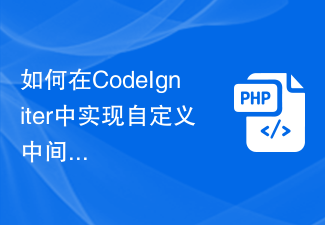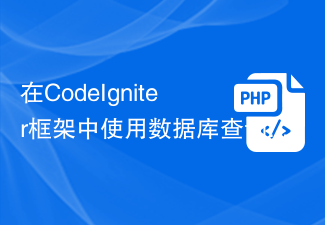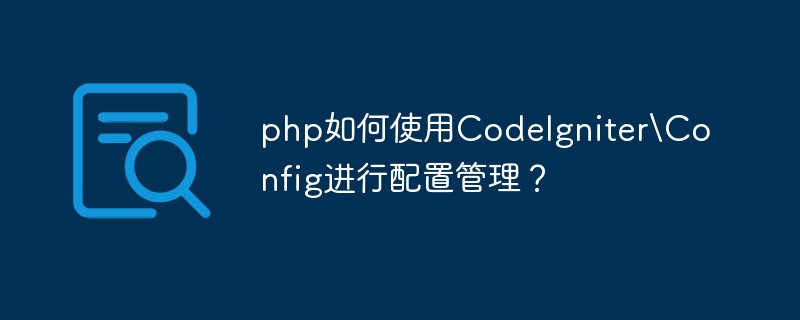 Backend Development
Backend Development PHP Tutorial
PHP Tutorial PHP implements CodeIgniter paging examples and multi-condition query solutions
PHP implements CodeIgniter paging examples and multi-condition query solutionsThis article mainly introduces PHP CodeIgniter paging examples and detailed explanations of multi-condition query ideas. It is very good and has reference value. Friends in need can refer to it
When using the CI framework recently, use I have installed the paging class of CI. I used to use the front-end paging class. This time I simply used the one that comes with the framework. I might as well record it in my forgetful mind.
Because there is a conditional filtering form on the page, the desired effect is that after entering the conditions, the entered conditions can be maintained after the page jump. After thinking about it for a while, I came up with the following code.
controller code
class Monitors extends CI_Controller {
public function warning(){
$config= array();
$config['per_page'] = 15; //每页显示的数据数
$current_page = intval($this->input->get("per_page")); //获取当前分页页码数
$status=$this->input->get("filter-status",TRUE);
$level=$this->input->get('filter-level',TRUE);
$timestamp=$this->input->get('filter-timestamp',TRUE);
$all = $this->monitors_m->getAllData($current_page,$config['per_page'],$status,$timestamp,$level);
//这里返回的有总条数和具体的数据,根据自己的情况略加修改即可
$data['allevent'] = $all['content'];
$config['total_rows'] = $all['count'];//总条数
$config['num_links'] = 3;//页码连接数
$config['use_page_numbers'] = TRUE;
$config['page_query_strings'] = TRUE;//关键配置
$config['base_url'] = base_url().'index.php/monitors/warning?'&filter-status='.$status.'&filter-level='.$level.'&filter-timestamp='.$timestamp;//关键配置
$this->load->library('pagination');//加载ci pagination类
$this->pagination->initialize($config);
$data['page'] = $this->pagination->create_links();//关键代码
$this->load->view("monitors_v",$data);
}
Key configuration parameters
$config[‘page_query_string']
If If set to true, the url will be "index.php/monitors/warning?per_page=20" like this
[Note] "per_page" is the query string passed by default, but you can also use $config[ 'query_string_segment'] = 'your string' to configure
In my solution, it is set to TRUE. Of course, TRUE is the default value, and you can leave it alone;
$config[‘base_url']
When it is initially set to the following situation, it is possible to perform conditional filtering on a certain page, but after the jump, the conditions are no longer due to refresh problems.
$config['base_url'] = base_url().'index.php/monitors/warning;
Use the following method, roar hoho
$status=$this->input->get("filter-status",TRUE);
$level=$this->input->get('filter-level',TRUE);
$timestamp=$this->input->get('filter-timestamp',TRUE);
$config['base_url'] = base_url().'index.php/monitors/warning?'&filter-status='.$status.'&filter-level='.$level.'&filter-timestamp='.$timestamp;//关键配置
view page The code
is just one sentence. Just add this sentence where you need to place the paging element. The $page variable here is stored in the controller. $this->pagination->create_links ();
<?php echo $page?>
Set paging style
The bootstrap style is used here
$config['first_link'] = "<<";//首页 $config['prev_link'] = "<";//上一页 $config['next_link'] = ">";//下一页 $config['last_link'] = ">>";//尾页 $config['full_tag_open'] = '<ul class="pagination pagination-split">'; $config['full_tag_close'] = '</ul>'; $config['first_tag_open'] = '<li>';//第一个链接的起始标签。 $config['first_tag_close'] = '</li>';//第一个链接的结束标签。 $config['next_tag_open'] = '<li>';//下一页链接的起始标签。 $config['next_tag_close'] = '</li>';//下一页链接的结束标签。 $config['prev_tag_open'] = '<li>';//上一页链接的起始标签。 $config['prev_tag_close'] = '</li>';//上一页链接的结束标签。 $config['cur_tag_open'] = '<li class="active"><a>'; $config['cur_tag_close'] = '</a></li>';//当前页链接的结束标签。 $config['num_tag_open'] = '<li>';//数字链接的起始标签。 $config['num_tag_close'] = '</li>';//数字链接的结束标签。
Related recommendations:
CI framework (CodeIgniter) operation redis step analysis
CodeIgniterDetailed explanation of the steps to use redis
CI framework (CodeIgniter) method of operating redis
The above is the detailed content of PHP implements CodeIgniter paging examples and multi-condition query solutions. For more information, please follow other related articles on the PHP Chinese website!
 如何在CodeIgniter中实现自定义中间件Jul 29, 2023 am 10:53 AM
如何在CodeIgniter中实现自定义中间件Jul 29, 2023 am 10:53 AM如何在CodeIgniter中实现自定义中间件引言:在现代的Web开发中,中间件在应用程序中起着至关重要的作用。它们可以用来执行在请求到达控制器之前或之后执行一些共享的处理逻辑。CodeIgniter作为一个流行的PHP框架,也支持中间件的使用。本文将介绍如何在CodeIgniter中实现自定义中间件,并提供一个简单的代码示例。中间件概述:中间件是一种在请求
 CodeIgniter中间件:加速应用程序的响应速度和页面渲染Jul 28, 2023 pm 06:51 PM
CodeIgniter中间件:加速应用程序的响应速度和页面渲染Jul 28, 2023 pm 06:51 PMCodeIgniter中间件:加速应用程序的响应速度和页面渲染概述:随着网络应用程序的复杂性和交互性不断增长,开发人员需要使用更加高效和可扩展的解决方案来提高应用程序的性能和响应速度。CodeIgniter(CI)是一种基于PHP的轻量级框架,提供了许多有用的功能,其中之一就是中间件。中间件是在请求到达控制器之前或之后执行的一系列任务。这篇文章将介绍如何使用
 在CodeIgniter框架中使用数据库查询构建器(Query Builder)的方法Jul 28, 2023 pm 11:13 PM
在CodeIgniter框架中使用数据库查询构建器(Query Builder)的方法Jul 28, 2023 pm 11:13 PM在CodeIgniter框架中使用数据库查询构建器(QueryBuilder)的方法引言:CodeIgniter是一个轻量级的PHP框架,它提供了许多功能强大的工具和库,方便开发人员进行Web应用程序开发。其中一个令人印象深刻的功能是数据库查询构建器(QueryBuilder),它提供了一种简洁而强大的方法来构建和执行数据库查询语句。本文将介绍如何在Co
 php如何使用CodeIgniter5框架?Jun 01, 2023 am 11:21 AM
php如何使用CodeIgniter5框架?Jun 01, 2023 am 11:21 AMCodeIgniter是一个轻量级的PHP框架,采用MVC架构,支持快速开发和简化常见任务。CodeIgniter5是该框架的最新版本,提供了许多新的特性和改进。本文将介绍如何使用CodeIgniter5框架来构建一个简单的Web应用程序。步骤1:安装CodeIgniter5下载和安装CodeIgniter5非常简单,只需要遵循以下步骤:下载最新版本
 PHP开发:使用 CodeIgniter 实现 MVC 模式和 RESTful APIJun 16, 2023 am 08:09 AM
PHP开发:使用 CodeIgniter 实现 MVC 模式和 RESTful APIJun 16, 2023 am 08:09 AM随着Web应用程序的不断发展,更加快速和高效地开发应用程序变得非常重要。并且,随着RESTfulAPI在Web应用程序中的广泛应用,对于开发人员来说,必须理解如何创建和实现RESTfulAPI。在本文中,我们将讨论如何使用CodeIgniter框架实现MVC模式和RESTfulAPI。MVC模式简介MVC(Model-Vie
 使用PHP框架CodeIgniter开发一个实时聊天应用,提供便捷的通讯服务Jun 27, 2023 pm 02:49 PM
使用PHP框架CodeIgniter开发一个实时聊天应用,提供便捷的通讯服务Jun 27, 2023 pm 02:49 PM随着移动互联网的发展,即时通信变得越来越重要,越来越普及。对于很多企业而言,实时聊天更像是一种通信服务,提供便捷的沟通方式,可以快速有效地解决业务方面的问题。基于此,本文将介绍如何使用PHP框架CodeIgniter开发一个实时聊天应用。了解CodeIgniter框架CodeIgniter是一个轻量级的PHP框架,提供了一系列的简便的工具和库,帮助开发者快速
 如何使用PHP框架CodeIgniter快速搭建一个后台管理系统Jun 27, 2023 am 09:46 AM
如何使用PHP框架CodeIgniter快速搭建一个后台管理系统Jun 27, 2023 am 09:46 AM现今互联网时代,一款深受用户喜爱的网站必须具备简洁明了的前端界面和功能强大的后台管理系统,而PHP框架CodeIgniter则是一款能够让开发者快速搭建后台管理系统的优秀框架。CodeIgniter拥有轻量级、高效率、易扩展等特点,本文将针对初学者,详细说明如何通过该框架快速搭建一个后台管理系统。一、安装配置安装PHPCodeIgniter是一个基于PHP的
 php如何使用CodeIgniter\Config进行配置管理?Jun 02, 2023 pm 06:01 PM
php如何使用CodeIgniter\Config进行配置管理?Jun 02, 2023 pm 06:01 PM一、CodeIgniter简介CodeIgniter是一个轻量级且全面的PHP开发框架,旨在为Web开发人员提供快速且强大的工具来构建Web应用程序。它是一个开源的框架,使用MVC架构模式来实现快速开发和基础功能,同时支持多种数据库。二、Config库简介Config库是CodeIgniter框架中的一个组件,用于对代码进行配置管理。Config库包含了很多


Hot AI Tools

Undresser.AI Undress
AI-powered app for creating realistic nude photos

AI Clothes Remover
Online AI tool for removing clothes from photos.

Undress AI Tool
Undress images for free

Clothoff.io
AI clothes remover

AI Hentai Generator
Generate AI Hentai for free.

Hot Article

Hot Tools

MinGW - Minimalist GNU for Windows
This project is in the process of being migrated to osdn.net/projects/mingw, you can continue to follow us there. MinGW: A native Windows port of the GNU Compiler Collection (GCC), freely distributable import libraries and header files for building native Windows applications; includes extensions to the MSVC runtime to support C99 functionality. All MinGW software can run on 64-bit Windows platforms.

mPDF
mPDF is a PHP library that can generate PDF files from UTF-8 encoded HTML. The original author, Ian Back, wrote mPDF to output PDF files "on the fly" from his website and handle different languages. It is slower than original scripts like HTML2FPDF and produces larger files when using Unicode fonts, but supports CSS styles etc. and has a lot of enhancements. Supports almost all languages, including RTL (Arabic and Hebrew) and CJK (Chinese, Japanese and Korean). Supports nested block-level elements (such as P, DIV),

WebStorm Mac version
Useful JavaScript development tools

Atom editor mac version download
The most popular open source editor

ZendStudio 13.5.1 Mac
Powerful PHP integrated development environment





